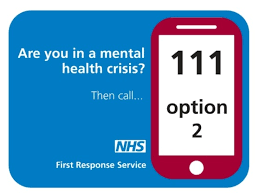Fact
- Over one in every 100 deaths (1.3%) in 2019 were the result of suicide*
- The male suicide rate was 15.3 per 100,000* compared to the female suicide rate of 4.9 per 100,000 which means the suicide rate is over 3 times as high among men than women*
- In 2019, suicide was the largest cause of death of men aged 20-49 and women most at risk of suicide are between the ages of 50-54**
- 1 in 5 of us will have suicidal thoughts at some point in our life ** Having suicidal thoughts doesn’t mean that someone has a mental illness, but there is a connection between mental ill health and suicidal thoughts
Myth
Talking to someone about suicide could make them more likely to end their life
Fact*: Talking about suicide won’t make somebody’s suicidal thoughts worse or make them more likely to harm themselves. Starting a conversation about suicidal thoughts can help with suicide prevention by creating a safe space for them to talk about how they are feeling. You may also use this conversation as an opportunity to explore support options, such as professional support.
If a person is serious about ending their life, they can’t be helped
Fact*: While suicide is a serious public health problem, a lot can be done to prevent it with timely support
If a person is talking about their suicidal thoughts, they won’t act on them
Fact*: Talking about suicide can be a plea for help. Don’t assume that someone won’t attempt to take their own life if they talk about suicide. Always take suicidal feelings seriously.
People who are suicidal want to day
Fact*: The majority of people who feel suicidal do not actually want to die; they just want the situation they’re in or the way they’re feeling to stop. The distinction may seem small, but it is very important. It’s why talking through other options at the right time is so vital.
You have to have a mental illness to think about suicide
Fact*: One in five people have thought about suicide at some point in their life—Not all people who die by suicide have a mental health condition. Though people living with a mental illness are generally more likely to feel suicidal, and make an attempt.
Warning signs that someone may be at risk of suicide
A change in someone’s personality and behaviour might be a sign that they are having suicidal thoughts. You may be the best judge of when someone you know is behaving differently. Changes can include:
•Becoming anxious
•Being more irritable and confrontational
•Not wanting to be around other people
•Avoiding contact with friends and family
•Having different problems with work or studies
•Having mood swings
•Becoming quiet
•Acting recklessly
•Sleeping too much or too little
•Saying negative things about themselves
If you’re not sure that someone is feeling suicidal, ask “Are you thinking about suicide?” or “Are you having thoughts of ending your life?”These questions are direct. It is better to address the person’s feelings directly rather than avoiding the issue. Remember that asking about suicide won’t make it more likely to happen.
What to say to someone who may be at risk of suicide
Before you can look out for others you need to look out for yourself, and that’s ok. If you’re not in the right headspace or don’t think you are the right person to have the conversation, try to think of someone else who could help. If you think that someone may be feeling suicidal encourage them to talk about how they are feeling. You may feel uncomfortable talking about suicidal feelings, you may not know what to say; this is entirely normal and understandable.
It might help to:
•Let them know that you care about them and that they are not alone
•Empathise with them –you could say something like, “I can’t imagine how painful this is for you, but I would like to try to understand”
•Be non-judgemental and don’t criticise or blame them
•Repeat their words back to them in your own words –this shows that you are listening, and repeating information can also make sure that you’ve understood them properly
•Ask about their reasons for living and dying and listen to their answers –try to explore their reasons for living in more detail
•Ask if they have felt like this before and if so, ask how their feelings changed last time
•Reassure them that they will not feel this way forever
•Encourage them to focus on getting through the day rather than focussing on the future
•Encourage them to seek help that they are comfortable with such as help from a doctor or counsellor, or support through a charity such as the Samaritans
•Follow up any commitments that you agree to
•Make sure someone is with them if they are in immediate danger
•Try to get professional help for the person feeling suicidal
•Get support for yourself
Remember that you don’t need to find an answer, or even to completely understand why they feel the way they do. Listening to what they have to say will at least let them know you care.
What to do if you are at risk of suicide
If you’re experiencing suicidal thoughts, seek professional sup-port and contact your:
•GP and ask for an emergency appointment
•Call NHS on 111 or Samaritans on 116123for urgent mental health helpline
•Speak to one of our CHS Mental Health First Aiders
Don’t make a decision today
•Be aware of your triggers
•Stay away from drugs and alcohol
•Go to a safe place
•Talk to other people
•Be around other people
•Distract yourself
* Samaritans UK **NHS Digital -Adult Psychiatric Morbidity Survey https://mentalhealth-uk.org/




